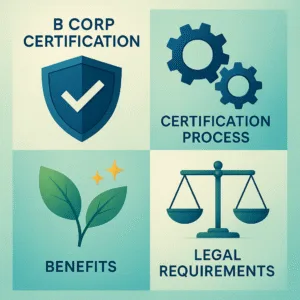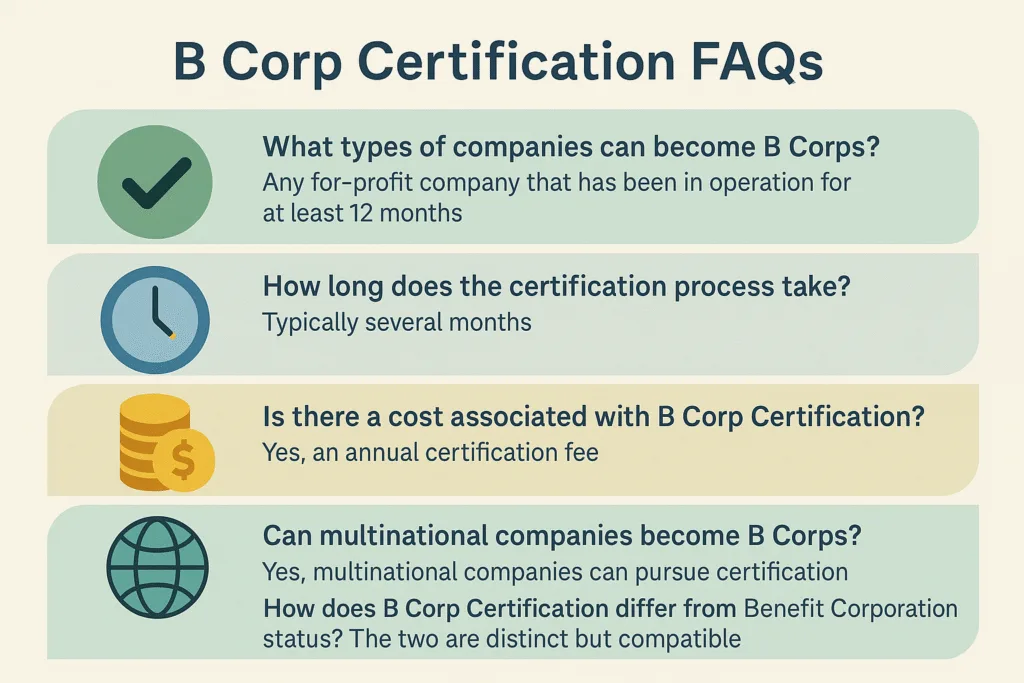
The Comprehensive Guide to B Corp Certification: Purpose, Process & Impact
B Corp Certification is a globally recognized designation for companies committed to high standards of social and environmental performance, accountability, and transparency. Administered by the nonprofit B Lab, this certification helps businesses balance profit with purpose, ensuring they consider the impact of their decisions on all stakeholders.
- What Is B Corp Certification?
- The Certification Process
- Benefits of Becoming a B Corp
- Legal Requirements and Accountability
In today’s business landscape, consumers and stakeholders increasingly value companies that prioritize ethical practices and sustainability. B Corp Certification offers a framework for businesses to demonstrate their commitment to these values. This guide delves into the essence of B Corp Certification, outlining the steps to achieve it, the advantages it brings, and the legal obligations involved.

Understanding B Corp Certification
B Corp Certification signifies that a company meets rigorous standards of social and environmental performance, verified by B Lab. It encompasses a holistic assessment of a company’s impact on its workers, customers, community, and the environment.
What Is B Corp Certification?
B Corp Certification is awarded to for-profit companies that meet high standards of social and environmental performance, accountability, and transparency. Unlike other certifications that focus on a single aspect, B Corp evaluates the overall impact of a company. Certified B Corps are legally required to consider the impact of their decisions on all stakeholders, not just shareholders. This certification is a testament to a company’s commitment to using business as a force for good.
What Is B Corp Certification? Definition, Standards, and Key Details
The Certification Process
Achieving B Corp Certification involves a comprehensive assessment of a company’s practices and policies. The process includes:
- B Impact Assessment (BIA): Companies complete the BIA, which evaluates their impact on governance, workers, community, environment, and customers. A minimum score of 80 out of 200 is required.
- Documentation and Verification: After completing the BIA, companies must provide documentation to verify their responses. B Lab reviews the documentation and may request additional information.
- Legal Requirement: Companies must amend their governing documents to reflect their commitment to considering stakeholder impact.
- Certification and Recertification: Once certified, companies must recertify every three years, demonstrating ongoing commitment and improvement.
How To Achieve B Corp Certification: A Step-by-Step Guide to the Certification Process
Benefits of Becoming a B Corp
Becoming a Certified B Corporation offers numerous advantages:
- Enhanced Reputation: Certification signals to consumers and partners that a company is committed to ethical practices.
- Attracting Talent: Many employees seek employers with strong social and environmental values.
- Access to a Supportive Community: B Corps are part of a global network of like-minded businesses.
- Continuous Improvement: The certification process encourages companies to regularly assess and improve their practices.
7 Key Benefits of Becoming a B Corp: Why Certification Matters for Your Business
Legal Requirements and Accountability
Certified B Corporations must meet specific legal requirements to ensure accountability:
- Stakeholder Governance: Companies must legally commit to considering the impact of their decisions on all stakeholders.
- Transparency: B Corps are required to publish public reports of their social and environmental performance.
- Ongoing Compliance: Companies must maintain their performance standards and undergo recertification every three years.
Beginner’s Guide to B Corp Legal Requirements and Accountability

FAQs
Any for-profit company that has been in operation for at least 12 months can pursue B Corp Certification, regardless of size or industry.
The process typically takes several months, depending on the company’s readiness and the complexity of its operations.
Yes, there is an annual certification fee based on the company’s revenue, as well as potential costs for legal adjustments and consulting.
Yes, multinational companies can pursue certification, but they must meet additional requirements and may need to certify individual subsidiaries.
B Corp Certification is a third-party certification by B Lab, while Benefit Corporation is a legal status conferred by state law. A company can be both.
Embracing Purpose-Driven Business with B Corp Certification
If your company is committed to balancing profit with purpose, consider pursuing B Corp Certification. It not only enhances your brand’s reputation but also aligns your operations with global standards for social and environmental responsibility.
